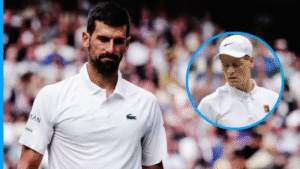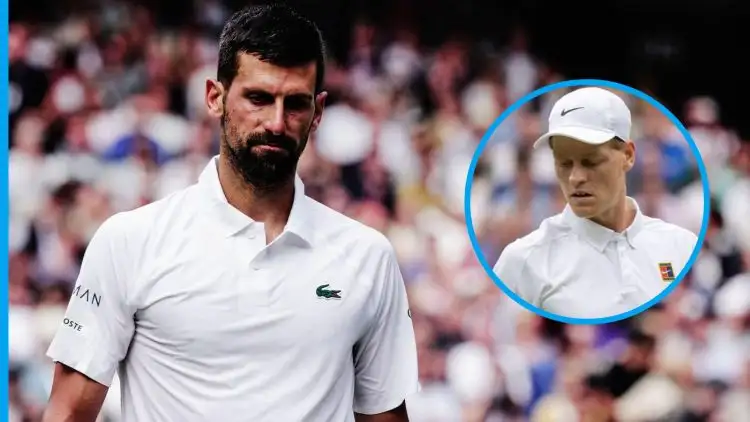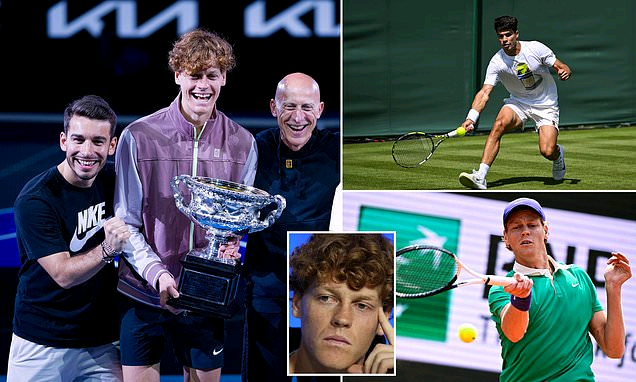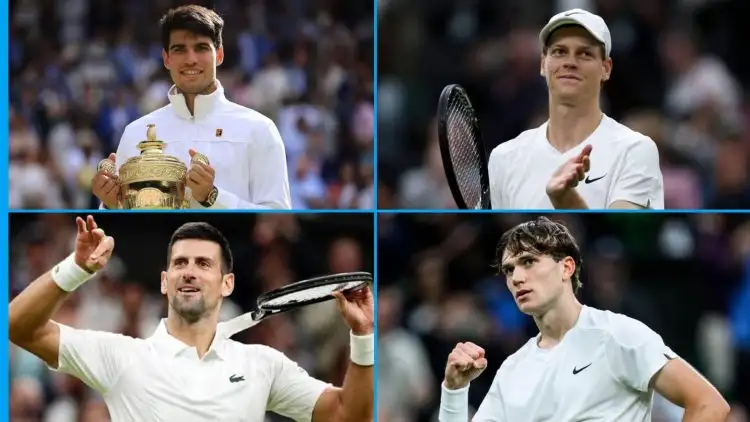**Jannik Sinner Agrees with John McEnroe on Novak Djokovic After Private Conversations: …………………………..
In the world of professional tennis, few players have managed to carve out a reputation as compelling and multifaceted as Novak Djokovic. His unmatched record, athletic prowess, and controversial moments have often made him a subject of intense debate among fans, players, and analysts alike. Recently, a surprising development added a new dimension to these discussions: Italian rising star Jannik Sinner publicly expressed agreement with former legend John McEnroe’s nuanced critiques of Djokovic, following private conversations with the American tennis icon.

This convergence of perspectives among a young, upcoming player and an outspoken former champion signals a potentially significant shift in the perception of Djokovic within the tennis community. In this article, we explore the background of these viewpoints, the nature of the private conversations, and the broader implications for the sport.
—
**1. Contextual Background: The Players and the Public Discourse**
**a. Novak Djokovic: A Titan with a Complex Legacy**
Novak Djokovic, born in 1987 in Serbia, has been one of the most dominant figures in tennis over the past decade. With 24 Grand Slam titles to his name as of 2023, Djokovic’s achievements place him among the greatest players of all time. His exceptional flexibility, mental toughness, and tactical intelligence have set new standards in the sport.
However, Djokovic’s career has not been without controversy:
– **Vaccine and COVID-19 Stance:** His outspoken skepticism and initial resistance to COVID-19 vaccination led to bans from certain tournaments, notably the Australian Open in 2022.
– **Tournament Conduct and Sportsmanship:** While generally regarded as respectful on court, Djokovic has had moments that drew criticism, including disputes with officials and opponents.
– **Political and Social Issues:** His outspoken positions on various societal issues have sometimes been polarizing.
**b. John McEnroe: The Legendary Critic**
John McEnroe, a former World No. 1 and seven-time Grand Slam singles champion, is renowned for his fiery temperament and candid commentary. Post-retirement, McEnroe has become one of the most outspoken voices in tennis, often criticizing players’ conduct, the sport’s administration, and occasionally its champions.
His opinions on Djokovic have been particularly pointed, especially in recent years, where he has raised concerns about Djokovic’s approach to the sport’s regulations, his public statements, and his handling of certain controversies.
**c. Jannik Sinner: The Young Prodigy**
Born in 2001 in Italy, Jannik Sinner is widely regarded as one of the most promising talents in men’s tennis. Known for his mature game, strategic acumen, and humility, Sinner has rapidly ascended the rankings and garnered respect from peers and analysts.
As a young player, Sinner’s perspectives are often scrutinized for their potential to shape future tennis narratives. His recent statements aligning with McEnroe’s critique of Djokovic mark a notable moment in his emerging public stance.
**2. The Private Conversations: From Confidentiality to Public Discourse**
The details of the private conversations between Sinner and McEnroe remain largely confidential, but several sources suggest that these dialogues revolved around Djokovic’s role in the sport, his conduct, and the broader ethical questions surrounding his career.
**a. The Content of the Discussions**
Reports indicate that McEnroe shared his candid opinions on Djokovic’s approach to the game, his handling of controversies, and the importance of maintaining integrity and sportsmanship in tennis. Sinner, having interacted closely with veteran players and observing Djokovic’s career from a young age, reportedly expressed agreement with McEnroe’s assessments.
**b. The Nature of Agreement**
Sinner’s agreement appears to be rooted in respect for the sport’s traditional values—fair play, honesty, and respect—and concerns about how Djokovic’s actions, whether intentional or perceived, influence the sport’s reputation. Sinner reportedly emphasized the importance of role models and the responsibility of top players to uphold certain standards.
**c. The Significance of Private Discourse Becoming Public**
While the conversations were initially private, Sinner’s subsequent public statements have amplified their impact. This shift underscores the evolving dynamics within tennis, where generational perspectives and outspoken opinions intersect.
**3. Analyzing the Perspectives: Points of Convergence and Divergence**
**a. Common Ground**
– **Respect for Tennis’s Integrity:** Both McEnroe and Sinner emphasize the importance of maintaining the sport’s integrity, fairness, and sportsmanship.
– **Concerns Over Conduct:** They share reservations about certain behaviors or decisions by Djokovic that could undermine the sport’s image.
– **Role Modeling:** Recognizing the influence of top players on young fans and aspiring professionals, they advocate for exemplary conduct.
**b. Diverging Views**
– **Context and Circumstances:** McEnroe’s critiques often focus on specific incidents or broader behavioral patterns, sometimes emphasizing emotional reactions. Sinner, as a rising player, might approach these issues with a more nuanced or developmental perspective.
– **Approach to Criticism:** McEnroe has been more direct and outspoken, while Sinner’s agreement suggests a more measured stance, perhaps reflecting his respect for Djokovic’s achievements despite reservations.
**4. Broader Implications for Tennis**
**a. Shaping Public Perception**
The alliance of perspectives between a veteran critic and a young star can influence how fans and stakeholders perceive Djokovic. It may lead to increased scrutiny or calls for accountability, especially if these views gain traction.
**b. Impact on Djokovic’s Legacy**
While Djokovic’s accomplishments are undeniable, ongoing controversies fueled by perceptions of misconduct or inconsistent behavior could affect his historical standing. The endorsement of critical viewpoints by emerging players signals a potential shift in how future generations view the reigning champions.
**c. The Role of Generational Change**
Sinner’s agreement with McEnroe highlights a broader narrative: the emergence of a new generation of players who may prioritize sportsmanship and integrity differently. This evolution could influence the culture of professional tennis in the coming years.
**d. Ethical and Governance Considerations**
The public discourse might pressure tennis authorities to enforce rules more stringently or rethink policies related to player conduct, health protocols, and social responsibilities.
**5. Reactions from the Tennis Community**
**a. Fans and Analysts**
Many fans appreciate the honesty and transparency, viewing this as a healthy critique that could lead to positive change. Others worry about potential divisions within the sport’s elite.
**b. Players and Coaches**
Some players might sympathize with the concerns raised, especially younger athletes eager to establish their own ethos. Coaches and mentors may also see this as an opportunity to reinforce values of fair play.
**c. Tennis Administrators**
Official bodies may interpret these public statements as signals to reinforce codes of conduct, fairness, and transparency in the sport.
**6. Future Outlook: Potential Developments and Challenges**
– **Ongoing Dialogue:** Expect continued discussions among players, commentators, and officials about ethics, conduct, and the sport’s future.
– **Influence on Player Behavior:** Sinner’s stance might inspire other young players to voice their opinions or adopt certain standards.
– **Djokovic’s Response:** The Serbian star may choose to address these critiques publicly or privately, shaping subsequent narratives.
– **Evolution of Tennis Culture:** The sport may see a shift toward emphasizing sportsmanship, integrity, and respect, influenced by these emerging perspectives.



